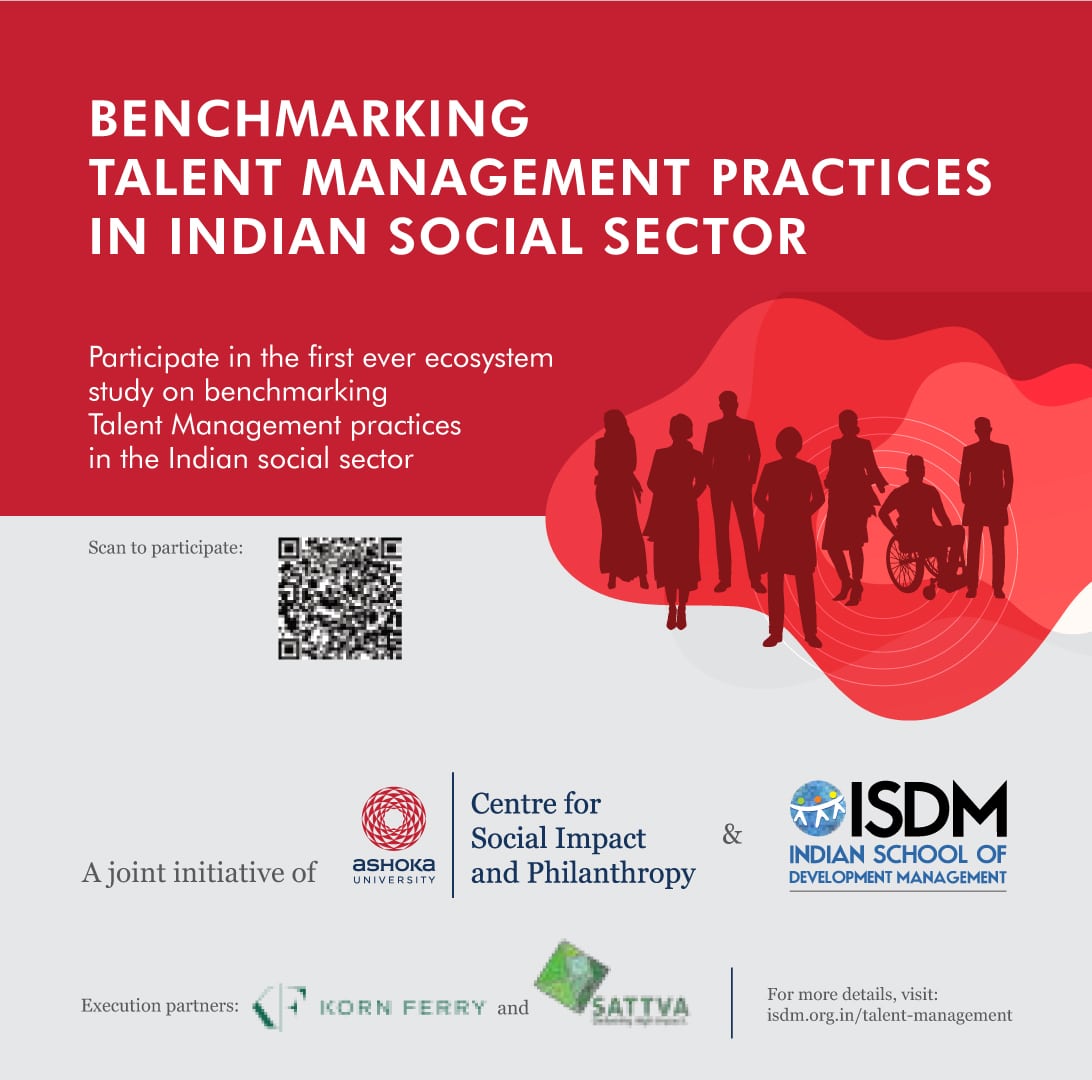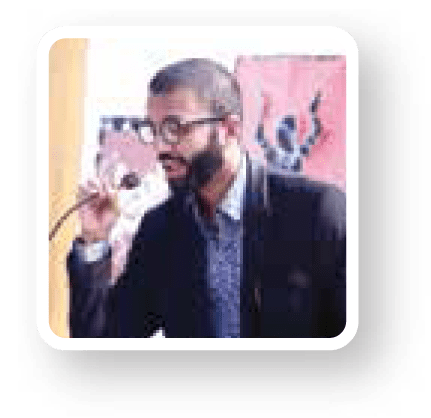
DIRECTOR's MESSAGE
Dear Readers,
Greetings from the Indian School of Development Management (ISDM)!
The ISDM family is thrilled to bring to you, the next edition of its quarterly newsletter. As a team and an organisation, ISDM is extremely optimistic and sets itself really tall goals to achieve. Our newsletter is but a small reflection of all that is happening here.
The class of 2021-2022 of the Post Graduate Program in Development Management (PGP DM) began their 47-week journey with us this July. This year's class, as always, represents students from different states, regions, communities and diverse educational backgrounds. The students have commenced Term II in October and are now engaged in their first immersive term, known as Realising India.
PGP DM has established itself as a pioneering program for the Indian Social Sector in the last five years of ISDM's existence. The attestation of the program's success can be seen from our 100% placement record for the last class of the program, i.e., the class of 2020-2021. All of the students of the class have been placed in leading social purpose organisations, corporate social responsibility cells, consulting firms and other social enterprises. With the placement of the last group of alumni, we now have more than 230 Development Managers who are working in different roles and capacities within the sector.
Learning from our achievements and drawing insights from challenges and the paradigmatic shifts within the sector that the pandemic has caused, the team at ISDM is revisiting its strategies and efforts towards a new and revitalised PGP DM and a more resilient and stronger ISDM 2.0. There have been curricula changes, pedagogic transformations, revisions to our assessment structures as well as on-boarding faculty and leaders who are harbingers of change to the sector. The organisation has also brought on board several new members in senior leadership positions to help us reach our audacious goals in the short and long terms.
Our executive education program is now the Strategic Capacity Building vertical, and we are excited about the many new partnerships and projects that have been initiated in the last few months.
We look forward to the encouragement and feedback from our readers and well-wishers, and we hope you will find this newsletter interesting. Wishing everyone a prosperous, serene, healthy and peaceful festive season.
Warmly,
|
|
ISDM's LEARNING PROGRAMS
IN DEVELOPMENT MANAGEMENT
|
Transitioning to PGP DM In tune with the dynamic needs of the social sector and the response of the ecosystem to the program and its graduates in the previous years, ISDM’s Post Graduate Program in Development Leadership transitioned into the Post Graduate Program in Development Management (PGP DM) in the year 2020-2021. The new curriculum has been sharpened and re-designed under the leadership of Professor AK Shiva Kumar, Chairperson, Academic Council, ISDM. The revisions reflect contemporary thought within management education, as advocated by Srikant Datar, David Garvin and Patrick Cullen, reiterating that a right balance between the skills of knowing, doing and being is essential in management. From 52 weeks, the program is now 47-weeks long and builds the capacities of young adults to work in leadership and management positions in social purpose organisations (SPOs). |
PGP DL to PGP DM
|
Watch this space for more updates on PGP DM!
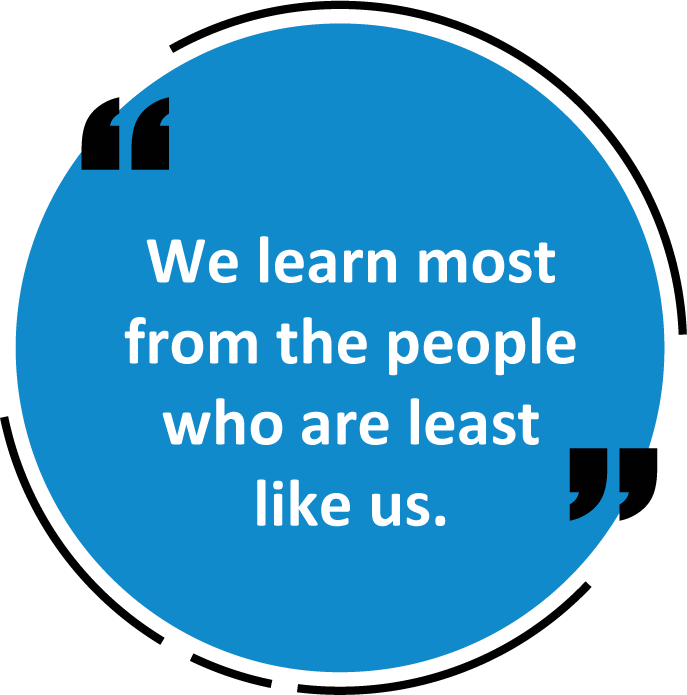
|
Diversity and Vibrancy in PGP DM for 2021-22 These words could not be truer anywhere than at ISDM. The fifth cohort of ISDM's PGP DM is unique in its diversity. We are excited to report that women comprise more than two-thirds of our enrolments for the program this year. More below: Class of 2021-22 at a Glance |

Guest Lectures at ISDM
The PGP DM program for the class of 2021-22 began with Term Zero that was devoted to building foundational skills of the cohort as required for the intensive 47-week journey. This term included a diverse range of sessions on data analysis, economic reasoning, concepts in case study practices and plagiarism and MS Excel. Other special series included Prof A K Shiva Kumar's Vignettes of India's Development Story, Effective Listening by Mr. Shashi Nair, Storytelling by Mr. Ameen Haque and Effective Presentation Making by Mr. Suman Srivastava in a series dedicated to building communication skills.
Term I kicked off with a new course on Data Analysis in Development and interactions with eminent personalities within the social sector as part guest lecturers' series. Term II brought a multi-domain lecture series called 'sangam' for the students to engage with eminent personalities in the fields of social impact, public service, arts and culture.
DEVELOPMENT MANAGEMENT-IN PRACTICE
Realising India
This month, our students will head out to districts in Uttar Pradesh and Madhya Pradesh for their two-week structured immersion called Realising India (RI). As part of their learning in Term II, the students will use research methods to understand various aspects of the district, including the socio-political, demographic, cultural, administrative, geographical, political aspects as well as the different actors, and their relationships at play.
To know more about RI in the previous years, read here.
UPDATES FROM OUR PLACEMENT DESK
Despite complexities and grave challenges thrown by the ongoing pandemic, we are thrilled to announce that all students of the fourth cohort, the class of 2020-21, have been successfully placed across 14 cities in organisations working in education, health, gender development, poverty and social justice, water and sanitation, skill development and rural development, among others.
Placement at A Glance
|
No. of students applied 30No. of organisations 55Organisations applied 48 |
100% placements |
Approx. no. of organisations reached out to 50+No. of JDs 139Average salary INR 6.5 Lakhs |
|
Placement 2021 - sector-wise breakup 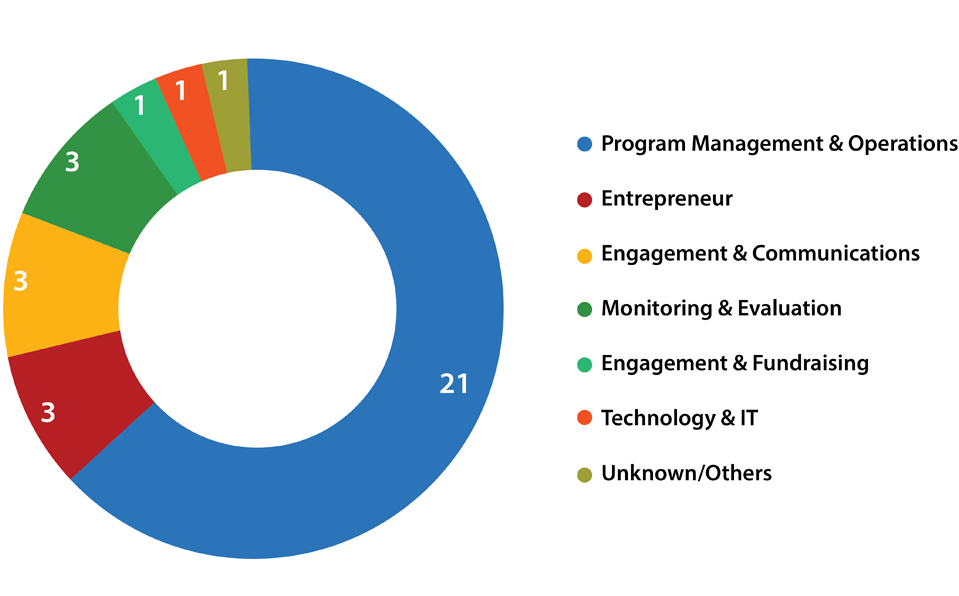
|
Placement 2021 - functional role-wise breakup 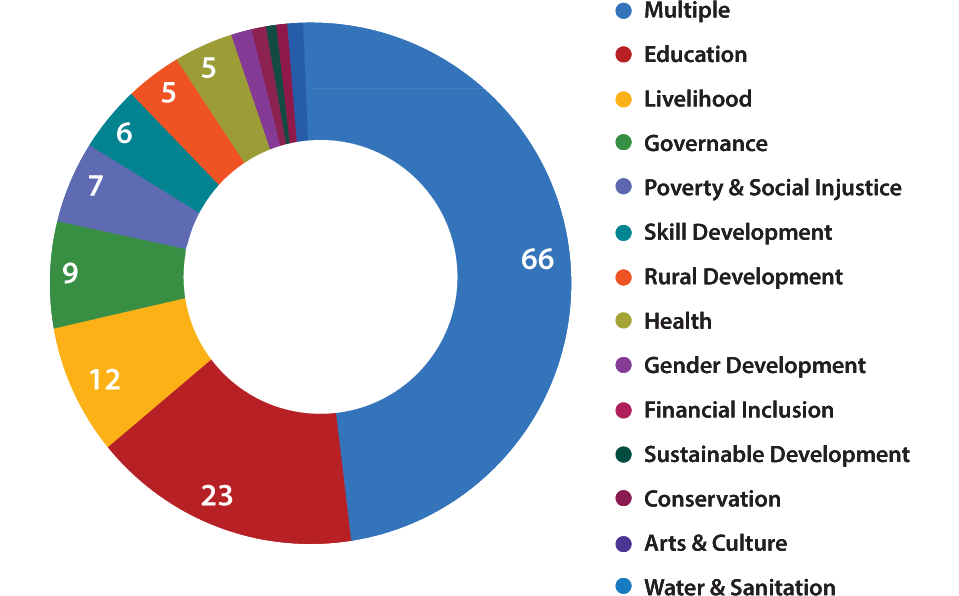
|
STRATEGIC CAPACITY BUILDING
As we envision ISDM as the fountainhead of knowledge in Development Management and transform the ways SPOs are managed and led, the Executive Education program at ISDM has been remoulded into the Strategic Capacity Building (SCB) program to assist professionals working in SPOs to grow by developing relevant Development Management and Leadership perspectives, knowledge and skills.
As part of the re-envisioned vertical, the ISDM team is already exploring partnerships with leading organisations from the sector. Read more here.
GOING DIGITAL
DIGITAL TRANSFORMATION AT ISDM
The digital transformation of ISDM is an integral element of change within our efforts to revitalise the organisation. We are already in Phase I of this transformation and our efforts are focussed on enhancing existing applications to provide an end-to-end digital experience to our students, teams and staff, as well as prospective students and our engagements with the larger ecosystem.
This includes revamping our website, admission experience and an enhanced learning management system for the classrooms through key features such as a dedicated students' dashboard and gradebook.
RESEARCH
IN DEVELOPMENT MANAGEMENT
|
Dipstick Study: Knowledge Commons for
Enhanced Management Practice in Social Purpose Organisations
ISDM and Centre for Social Impact and Philanthropy, Ashoka University have jointly undertaken an initiative towards curating, co-creating and disseminating knowledge commons on enabling management practices for wider use by the development sector ecosystem. This is to bridge the gap between the growing need for developing and promoting essential management practices within SPOs and the lack of available sector specific discourses and applications within the development space. Currently, many organisations primarily draw these practices from mainstream corporate discourses and their application often lacks contextualisation in the social impact space and the cornerstone mission and value-driven approach.
The study was conducted in two phases over August-September 2020 and 2021 and entailed interviewing 20 thought leaders with various organisational roles and experiences across domains.
Watch this space for the report that will come out soon. Read more here.

LIFE AT ISDM
|
The first event of the 'Guftagu Series' as part of our alumni engagement took place in Bengaluru on October 3, 2021. The series comprise of discussions with our alums across different cities to strengthen, re-structure, re-align and re-develop the ISDM-Alumni relationship. |
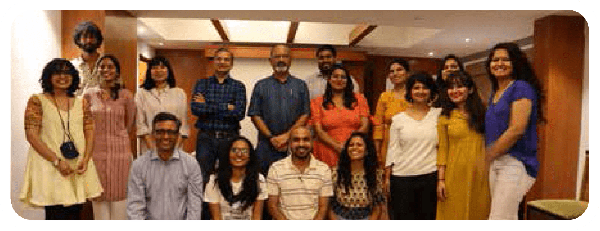
|
Development Managers in Action
|
|
Welcoming New Members to the ISDM Family!
As we continue to grow and evolve into a stronger and more resilient organisation, we extend a hearty welcome to the new members who have joined the ISDM family!

TRISHA VARMA Trisha comes from a background of market research, data analysis, market strategy and marketing. She is the founder of a consulting company and previously worked with Procter & Gamble, first in India, then in Singapore. |

ASEEM PUROHIT Aseem has over 31 years of experience in the financial software industry and joins ISDM from Odessa as Vice President - Sales and executive sponsor for Odessa's Corporate Social Responsibility (CSR) initiatives in the education and environment sectors in India. He has also been associated as a volunteer with EDUCAIT, a non-profit organisation that supports underprivileged children with their education. |

ADITI JHA Aditi has worked across the development sector with organisations such as HelpAge, Save the Children, and other smaller charities in India, and with Action Against Hunger and Teach Africa in the UK. She has 12 years of experience in implementing community-based programs, proposal writing, communication and fundraising. |
WHAT ARE WE READING?
Here's a peak into what our students, faculty and staff are reading

|
Letter from Birmingham Jail - Dr. Martin Luther King The "Letter from Birmingham Jail", also known as the "Letter from Birmingham City Jail" and "The Negro Is Your Brother", is an open letter written on April 16, 1963, by Martin Luther King Jr. It was his response to a public statement of concern and caution issued by eight white religious leaders of the South and reiterated that people have a moral responsibility to break unjust laws and to take direct action rather than waiting potentially forever for justice to come through the courts. |
|
The One Who Walks Away from Omelas - Ursula Le Guin The Ones Who Walk Away from Omelas" is a short story in philosophical fiction by American writer Ursula K. Le Guin. The story's narrator describes the seemingly utopian city of Omelas and the one injustice upon which this utopia depends. |

|
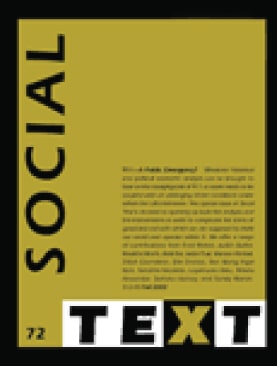
|
Imagining a Post Development Era - Arturo Escobar In this paper, Arturo Escobar deconstructs the way "development" is understood and defined. He questions the western and dominant discourse in identifying individuals, communities, countries and societies as underdeveloped. Escobar identifies it as a colonising discourse that needs to be re-examined by focusing on the local realities and daily lives of people. There is empha- sis on using individual senses to experience and define 'development'. He offers an alternative thought process to look at development. |
|
India as a Post-Colonial Welfare State Sony Pellissery - T.V.S. Sasidhar The chapter written by Sony Pellissery and T.V.S. Sasidhar in a handbook is edited by Bente Greve highlighting some of the critical aspects of the Indian Welfare State. It focusses on the definition of "development", examining whether it is from the coloniser's point of view or from that of colonised. The dilemma of 'tryst of living with contradictions' is brought forth by authors when they talk about the positions taken up by both Jawaharlal Nehru and BR Ambedkar and later by Amartya Sen and Jagdish Bhagwati. |
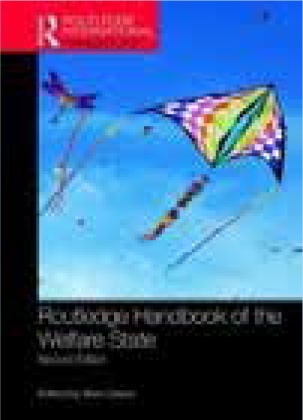
|
|
Contact Us: C 20/5-6, Sector-62. Noida, Uttar Pradesh 201301. (Opposite JSS Academy of Technical Education) | Phone: +91 99997 88216 | Email: contact@isdm.org.in |
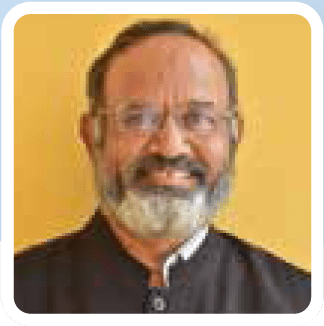


 The COVID-19 pandemic showed how we in the middle class continue to remain comfortable with inequality and injustice as we were indifferent to the protection of the working poor. It was only in the second wave that we learnt a very fundamental lesson in a pandemic, no one is safe until everyone is safe.
The COVID-19 pandemic showed how we in the middle class continue to remain comfortable with inequality and injustice as we were indifferent to the protection of the working poor. It was only in the second wave that we learnt a very fundamental lesson in a pandemic, no one is safe until everyone is safe.
